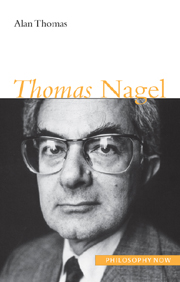Book contents
- Frontmatter
- Contents
- Preface
- Abbreviations
- 1 Subjective and objective
- 2 Understanding, knowledge and reason
- 3 Placing the mind in the physical world
- 4 The possibility of altruism
- 5 Practical objectivity, freedom and a realistic autonomy
- 6 Normative ethics: Nagel's hybrid ethical theory
- 7 Justice, equality and partiality
- Conclusion
- Notes
- Bibliography
- Index
Preface
- Frontmatter
- Contents
- Preface
- Abbreviations
- 1 Subjective and objective
- 2 Understanding, knowledge and reason
- 3 Placing the mind in the physical world
- 4 The possibility of altruism
- 5 Practical objectivity, freedom and a realistic autonomy
- 6 Normative ethics: Nagel's hybrid ethical theory
- 7 Justice, equality and partiality
- Conclusion
- Notes
- Bibliography
- Index
Summary
The aim of this book is systematically to exposit and to criticize some of the central themes of Thomas Nagel's philosophy, primarily for the benefit of a reader coming to Nagel's work for the first time. The good news, both from my point of view and that of the student of Nagel's work, is that he is an outstandingly clear writer. I have not felt that I have had much work to do in explaining his central ideas. The bad news from my point of view is that Nagel is a very wide-ranging philosopher who has made important contributions to nearly all of the central areas of philosophy. In a book of this restricted length I have not been able comprehensively to cover all of the issues that he discusses. My overall approach, in the light of both Nagel's clarity and comprehensiveness, has been to focus on the overall structure of his philosophy and the philosophical context in which it was developed. Fortunately, Nagel's work lends itself to this approach owing to the structural importance throughout his work of a central dichotomy between the subjective and the objective. I have aimed to bring out underlying themes and to come to some overall evaluation of his approach within the limited scope available to me. Inevitably I have prioritized an analysis of underlying structure as opposed to comprehensive coverage. Such important Nagelian topics as, to take just two examples, his panpsychism or his account of the good life and the moral life are omitted in this book. That is regrettable, but some difficult choices had to be made.
- Type
- Chapter
- Information
- Thomas Nagel , pp. vii - ixPublisher: Acumen PublishingPrint publication year: 2008

